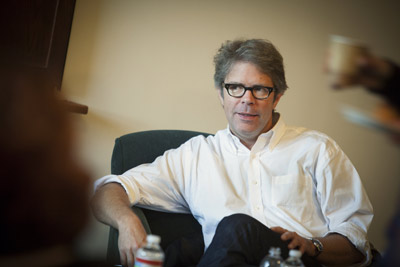Franzen on e-books, suspense and the environment
By Natalie O'Toole

Jonathan Franzen, essayist and author of the best-selling novels "The Corrections" and "Freedom," says that although he used to write to teach his readers, he now feels more equal with them.
"[At first] I was somehow imagining that I was writing for people who needed my instruction," he said during a question-and-answer session with undergraduate students Nov. 2 in Goldwin Smith Hall. "I came to feel that a better relation ... with the reader is more one of equals. Then, what I was looking for was not instruction, but a sense of recognition."
Franzen said that among his sources of inspiration are Paula Fox's novel "Desperate Characters." He called the 176-page work "a nearly perfect American novel," thanks to its unlikely suspense -- nothing happens, but the reader is still in suspense over the protagonist's worry about being bitten by a rabid cat.
"I feel more than ever that it's important to build suspense into a novel -- that's what we offer in the age of media distraction, electronic distraction -- the possibility of getting sucked into something," he said.
When asked about the effect of the e-revolution on writers, Franzen said, "The whole notion of cloud computing is so disturbing to me. It's already disturbing enough that I'm not putting ink on a page as I write. ... It was such a huge thing to go from a typewriter to a computer with a keyboard, and [now] my only option is gonna be some stupid touch-screen, auto-complete, word-processing program."
Franzen, who said he has never read an e-book, also noted that "piracy and monopoly threaten to drive down the price of the e-book ... the idea that content can be free. ... What's the motive for making something good if you're not gonna get paid for it? But I think along with that concept comes the certain notion of amateurism and a rejection of well-made things."
He continued: "I wouldn't want to impose my love of the physical book on anyone else. To me, writing is such a meaningful activity and reading is such a meaningful activity, that I like the substance; I like having a book that has a history ... that carries with it the sand from the beach I read it on, or the water damage from the year we lived in a damp apartment. ... I think the substance of a work of real substance is diminished by reading it on the same screen as you read crap. How seriously can you take Kafka when it just replaced The Huffington Post on your screen?"
Among other topics, Franzen also discussed how he thought teenagers responded to his work, trends in fiction he tried to emulate or avoid, character development and environmental writing (one of the themes in "Freedom" concerns environmental activism). In response to the latter, Franzen said: "I think in any kind of environmental writing you really have to think harder. ... How are you going to make this literature? Which is to say, how will you make this inhabit gray area? How can you make this funny and tragic rather than just a lecture that everybody has heard and nobody wants to hear again?"
While on campus, Franzen also gave a public reading Nov. 1 in Sage Chapel. The author related a trip to China and a golf-club factory in "The Chinese Puffin," a 2008 essay from his new book "Farther Away," and read excerpts from his most recent novel, "Freedom," about a cynical aging rock star. He also answered questions from the audience, talking about his aversion to reading criticism of his work and praising one of his favorite writers, Booker Prize winner Alice Munro.
"Everyone who cares about fiction finds their way to Munro," he said. "She may be the greatest living narrative writer in North America."
Franzen's visit was sponsored by the Barbara and David Zalaznick Reading Series, organized by the Creative Writing Program and the Department of English. Both Zalaznicks are members of the Class of 1976.
Natalie O'Toole '16 is a writer intern for the Cornell Chronicle.
Media Contact
Get Cornell news delivered right to your inbox.
Subscribe